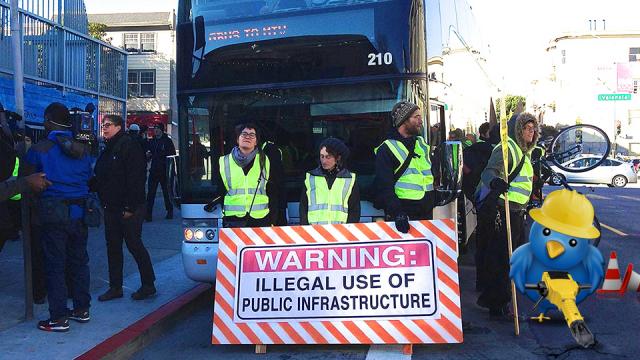
SAN FRANCISCO, Calif. – The city of San Francisco is running a deficit, urging its government workers to put more of their personal earnings into health care costs for themselves and their families. But this deficit, workers argue, could be overcome if major technology companies in the area weren’t given the immense tax breaks they currently receive.
Across the Bay Area, and especially as one heads south from San Francisco, labor activists and others are gearing up for what could become the next hotspot of American activism: making wealthy tech giants pay their share.
Last Wednesday, hundreds of members of SEIU Union 1021 and other supporters marched through downtown San Francisco to Twitter’s headquarters. They picketed for about an hour, calling for an end to the massive tax breaks the company gets in the name of building a larger job base for the city.
Twitter, according to the San Francisco Chronicle, was given some $55 million in tax breaks last year alone, and many economists and observers believe it will receive even more breaks in 2014. For workers and Bay Area residents, the numbers are hard to swallow and anger is brewing.
“What we are seeing is the foundation for inequality and it is because the large companies in this country are getting breaks when the average family is not,” said a former Silicon Valley web designer who, since leaving a Fortune 500 company last fall, has fought vigorously to educate residents on issues around inequality.
Twitter, of course, is not the only tech company receiving big tax breaks. Zynga, the maker of Facebook games like FarmVille, received $6 million in tax breaks in 2011, according to the San Francisco Examiner. Several other companies, such as Microsoft and Spotify, areapplying for their own exemptions.
What is arguably a tipping point in the growing fight against inequality in the Bay Area is the skyrocketing rent: prices have increased across San Francisco and the Peninsula, heading south towards San Jose, by some $1,500 across the board in recent years.
Now, families that have called the area home for decades are being forced to look elsewhere, farther away from their place of work, in order to meet the basic need of a roof over their head.
“We can’t pay the rising rental prices and we know that this is the direct result of these major companies offering higher salaries and housing stipends to their workers,” 48-year-old accountant Jose Manuel told Occupy.com last week.
Manuel, who is married with three children, said he and his family lived for eight years in a three-bedroom house in San Mateo. Then, two months ago, as his lease was running out for the fourth time, Manuel’s landlord informed him that the rent was increasing by $750, based on “the market.”
“We couldn’t do that. My employer has reduced the benefits we receive and this means we are paying more expenses out of pocket. I can’t compete with someone earning thousands more a month than we are and who is willing to pay a lot more for the same house,” he said.
Lately, even Silicon Valley seems to be taking notice of rising inequality, as companies and executives step forward to say all the right things – though many activists believe the tech firms’ PR is a way of deflecting angst away from companies and onto government.
Emmett Carson, chief executive and president of the Silicon Valley Community Foundation, said in a recent interview with the Chronicle that housing is, and continues to be, a pressing issue in the Valley.
“If prices continue to rise, the people at the bottom end of the income pile either double up in housing…they move further out, or, they take a larger share of their already limited income to try to find housing,” Carson said.
“And a healthy economy has to have housing, for everyone that lives in that community,” he continued. “For all the jobs in the economy, there needs to be a place for people to live. Just having economic success alone is not going to work out.”
But that type of rhetoric offers little solace to those facing eviction or massive increases in rental prices as a direct result of rising inequality fueled by regional tech giants like Twitter, Google and Facebook – companies which are not even paying their share in taxes.
A residential building owner who holds property throughout the Bay Area told Occupy.com that landlords know the market – and they are willing to boot out families in order to earn more money while rents are soaring. This, he said, “leads to many families and others who have honest jobs and make a decent living on the outside, unable to pay for their current homes.”
“They have to move farther and farther away to maintain the same quality housing. This is because of the tech companies and the much higher salaries and incentives they offer,” he said.
Adding to the rising popular anger is the fact that local governments are pushing initiatives to force workers to pay more out-of-pocket costs, while the tech behemoths get huge tax breaks – evading payment on hundreds of millions of dollars that would easily cover the shortfalls currently faced by workers.
“We are here to protest and make it heard that workers are not going to sit by and allow our housing costs to go up, our health care needs not met, while these big companies get the breaks that the average citizen needs,” said one protester while demonstrating against Twitter last week.
“To give in to this situation would be like committing suicide. This is the next war in America. A war for the people.”
But with no evidence pointing toward a decline in – or even a healthy debate over – the tax breaks companies are currently receiving, anti-gentrification action by Bay Area residents, workers and activists who demand more affordable housing are gathering momentum.
What may have begun small, with isolated protests against Google buses that shuttle workers from San Francisco to Silicon Valley each day, escalated last week with the demonstration at Twitter – and according to angry residents, the protests are just a beginning if their voices are not heard.
“We have the support of a vast majority of concerned citizens in the Bay Area and across the country,” said Manuel. “If we have to take matters into our own hands, we will and we will fight against the injustices that are causing families to struggle.”
3 WAYS TO SHOW YOUR SUPPORT
- Log in to post comments













